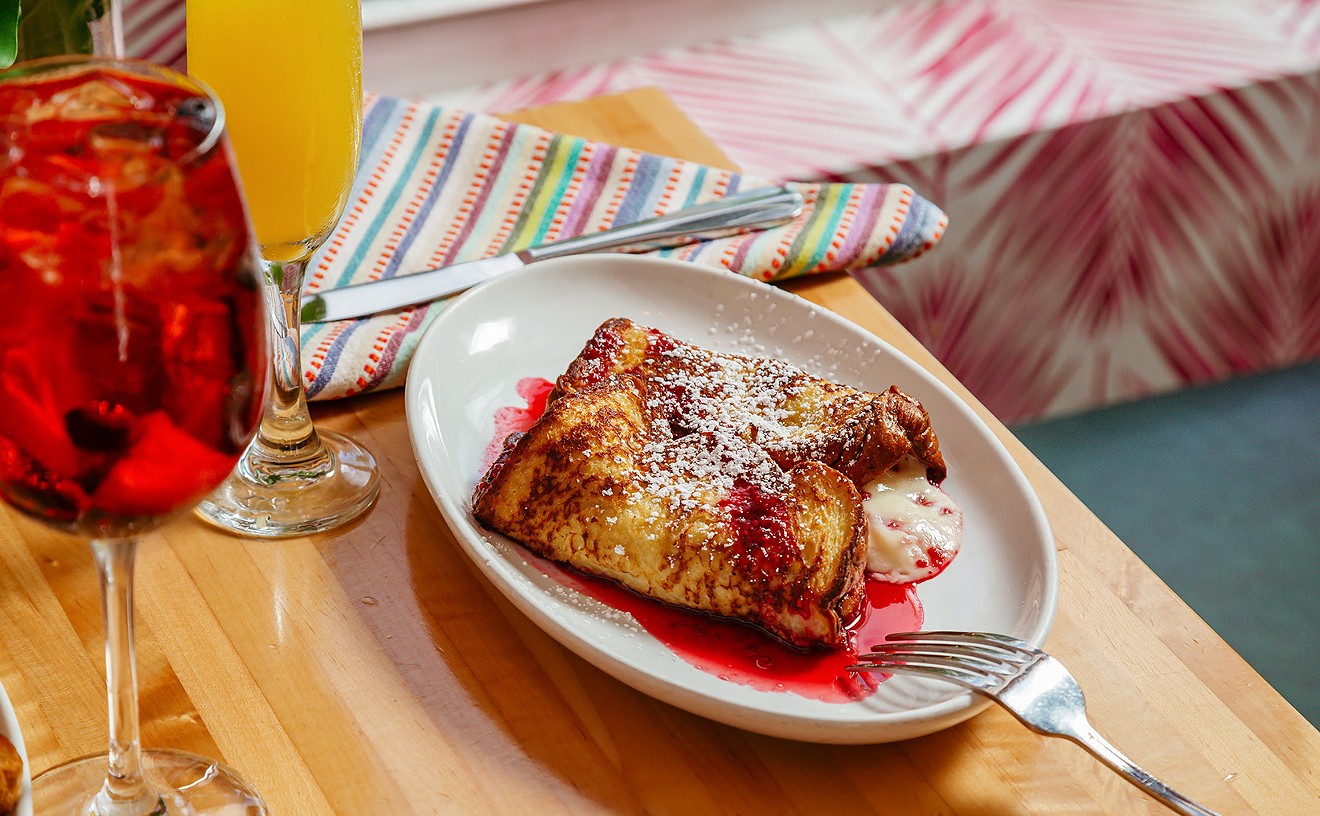One such countenance belongs to chef/owner Philippe Jacquet, who was born in Marseilles but raised in Paris. He and Miami native Scott Price opened the café this past August, on a Friday the 13th, more proof that luck has very little to do with operating a successful enterprise. The room is charming and quite snug, the sturdy oak tables so close together that any dramatic hand gesture would likely necessitate an apology to the person next to you. An open kitchen, backed by eye-catching black-and-white tiles, is even tighter; looking in on the cooks creates the same uneasy feeling as watching the movie Das Boot. Claustrophobics may opt for one of the ten roomier outdoor seats, though these offer a rather insipid view of the strip-mall parking lot.
The proximity of seating may dissuade one from discussing intensely personal matters over dinner, but it's a reviewer's delight. I could not only see, smell, and practically taste the food at the tables to my left and right, but could effortlessly listen in to the critical responses of those diners, who appeared to be neighborhood folks. Well, maybe not effortlessly. The acoustics of the room are loud, so I had to perk my ears a bit now and then to catch key phrases. What I heard was nothing but raves. Positive word of mouth has evidently spread beyond my strained ears, as Pastis has already built up an enthusiastic clientele: The place is packed for dinner, and don't even think of walking in on a weekend evening without reservations. Judging from the bustling, largely ladies lunch scene, customers from around the corner at the Shops at Sunset Place have discovered Pastis's daytime charms as well.
I read some years back that the ancient Romans added birds' tongues to their pâtés. Ever since I have routinely questioned my wife about "those little pink specks" prior to eating any. But I do love pâté, and Pastis's homemade duck-and-black peppercorn version ($7.50) is a dandy, the proper proportion of pork added to moisten the duck, but not, as is the case in lesser pâtés, enough to make it greasy. A wide, slender slice was served over a clump of field greens, with cornichons, olives, and croutons topped with fig tapenade.
Pastis serves caesar, spinach, and three mesclun-based salads (mesclun greens, nowadays as American as iceberg lettuce, have long been cultivated on the Côte d'Azur). We chose the greens tossed in rosemary-scented olive oil ($7.50), accompanied by olive bread croutons that were baked with goat cheese and drizzled with an ambrosial lavender honey imported from Vaucluse, another specialty of Provence. This is the sort of place where you can forego a main course altogether and make a satisfying meal out of gratinéed onion soup (or soup du jour), an appetizer, a salad, slices of warm, fresh baguette from the bread basket, and a glass of wine, of which 26 labels, mostly French, are offered.
Then again it's difficult to resist enticing entrées such as breast of chicken with apricots, green olives, and spicy Moroccan couscous, or grilled tuna steak on a bed of basil-infused navy beans. I didn't try either, but the couple next to me did, and both meals looked sumptuous. I can offer a firsthand recommendation of the lamb and duck dishes, though: The former consisted of half a honey-roasted rack of tender, medium-rare chops in a lamb jus reduction; the latter was a pair of duck legs and thighs cooked in an intriguing manner ($14.50). The chef starts by dry-marinating the duck with a standard confit mixture of salt, garlic, spices, and herbs, then cooks it for a short time in duck fat. Instead of continuing with the confit process, though, the duck gets braised slowly for three hours in cassis, red wine, duck stock, and vegetables. Healthier for sure, and deliciously paired with black currant sauce (and more lavender honey). Main courses are plated with steamed, lightly roasted cubes of herb-rubbed potatoes, and a mélange of zucchini, carrots, onions, and peppers that have been small-diced, seasoned, and roasted.
Provençal locals will tell you that a true bouillabaisse has to be prepared within 100 meters of Marseilles. That's because the stock traditionally is made with the thorny rockfish (rascasse), native to that region but economically unfeasible to import. Pastis substitutes a rich fish base enhanced with olive oil, garlic, tomatoes, and a smooth balance of fennel and saffron ($18.50). I was disappointed, though, in the selection of seafood: a multitude of mussels, a substantial piece of moist snapper, three plump shrimp, and a small lobster tail. Plenty to eat, but bouillabaisse usually contains more than four types of fish, and the shrimp and lobster were slightly overcooked. Accompanying the soup were toasted croutons and a dish of rouille (which comes from the French word for rusty, the color of this red pepper/garlic mayonnaise) that tasted good, but lacked the requisite kick of cayenne.
Desserts are homemade, too, and one can only marvel at how much the kitchen crew manages to produce from such a modest space. Tarte tartin ($5.00) was exemplary, with thin puff pastry dough and soft chunks of warm, caramelized apples. Two other tarts were also scrumptious, one filled with creamy chocolate ganache, the other with custard and fresh raspberries. Both featured classically crisp, buttery crusts of pâte sucrée.
I loved just about everything about Cafe Pastis. The food was wonderful, the ambiance enjoyable, service both personable and astute, and prices fair. Still, upon exiting the restaurant, I couldn't help but notice the birds in the trees were suspiciously silent.










